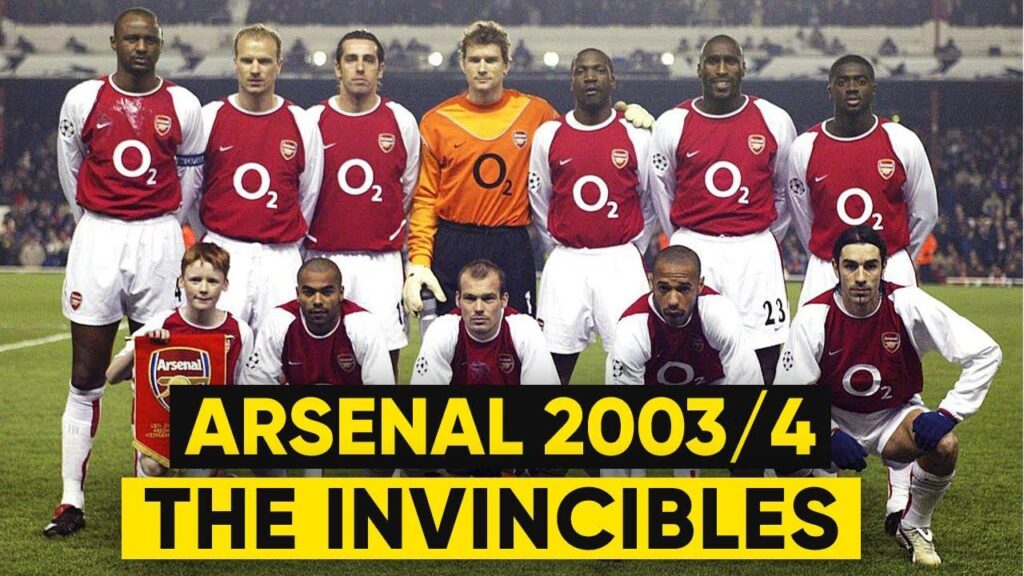In the annals of football history, few achievements resonate as profoundly as a team completing an entire season without a single defeat. The 2003-04 Arsenal squad, famously dubbed “The Invincibles,” etched their name in the sport’s lore with a record that remains unparalleled in the Premier League era. Under the astute management of Arsène Wenger, this unusual ensemble combined flair, resilience, and tactical ingenuity, capturing the imagination of fans and pundits alike. As we revisit their remarkable journey, we delve into the key players, pivotal moments, and the overarching philosophy that propelled Arsenal to this unprecedented feat, celebrating a legacy that continues to inspire future generations of footballers and supporters.
Table of contents
- Unraveling the Tactical Brilliance Behind Arsenals Invincible Season
- Key Players who Defined an Era of Success
- Lessons in Leadership from Arsène Wengers Tenure
- Legacy and Impact: How the 2003-04 Arsenal Team Reshaped English Football
- Wrapping Up
Unraveling the Tactical Brilliance Behind arsenals Invincible Season
The tactical ingenuity displayed by Arsenal during their unbeaten 2003-04 season was nothing short of revolutionary, setting a benchmark in modern football. Under the guidance of manager Arsène Wenger, the team blended technical skill with tactical flexibility, seamlessly transitioning between formations to exploit opponent weaknesses. Players such as Thierry Henry and Patrick Vieira weren’t just stars on the pitch; they embodied Wenger’s vision by executing strategies that emphasized fluidity and movement. Key tactical elements included:
- Fluid Offense: Players were encouraged to interchange positions, making them unpredictable and hard to mark.
- High Pressing Game: The team engaged opponents early, often winning back possession high up the pitch.
- Solid Defensive Structure: Led by Tony Adams and later Kolo Touré, the defense operated with a high line, reducing space for forward attackers.
This innovative approach was complemented by a squad that was both talented and cohesive. wenger’s ability to nurture young players and blend them with experienced campaigners ensured that the team had depth and resilience. The synergy between Robert Pirès and Dennis Bergkamp provided creativity and flair, while the tenacity of Freddie Ljungberg added an essential edge in midfield. The following table highlights key statistics from that iconic season, encapsulating their dominance:
| Statistic | value |
|---|---|
| Matches Played | 38 |
| Wins | 26 |
| Draws | 12 |
| Goals Scored | 73 |
| Goals Conceded | 26 |
Key Players Who Defined an Era of success
The legendary Arsenal team of 2003-04 was not merely a collection of talented players; it was a cohesive unit that revolutionized English football. At the helm was Arsène Wenger, whose innovative tactics and unwavering belief in attacking football set the tone for an unforgettable campaign. Key figures included Thierry Henry, whose electrifying pace and clinical finishing not only earned him the Premier League Golden Boot but also left defenders in his wake week after week. Alongside him,the likes of Patrick Vieira and robert Pirès provided the backbone and creativity necessary for a title-winning side,each contributing both goals and assists to build a formidable attacking force.
This team was marked by its resilience, with a defensive unit led by Tony Adams‘s successor, Kolo Touré, complemented by the reliable presence of Petr Čech in goal. With an unwavering commitment to their game plan, these individuals cultivated a winning mentality, pushing each other to excel.the seamless understanding between players such as Freddie Ljungberg and Gilberto silva exemplified the synergy that made the squad remarkable, impressively remaining unbeaten throughout the entire league season. This remarkable run gave rise to a new era in English football, leaving an indelible mark and setting the benchmark for generations to come.
Lessons in Leadership from Arsène Wengers Tenure
Throughout his tenure at Arsenal, Arsène Wenger personified a distinctive approach to leadership that transcended tactical acumen and fostered a culture of excellence. His philosophy emphasized trust in his players, which strengthened their confidence and encouraged a fluid style of play. He was known for building strong relationships with his squad, often treating them as partners rather than subordinates. Such an environment not only empowered individuals but also created a resilient team spirit that was crucial during the pressure of a long Premier League season. The results were evident, as the 2003-04 season became a testament to the efficacy of his methods, where players like Thierry Henry and Patrick Vieira flourished under his guidance.
Wenger’s commitment to innovation extended beyond the pitch; his emphasis on nutrition, sports science, and player welfare redefined professional standards in football leadership.His willingness to embrace change led to the construction of a state-of-the-art training facility at london Colney, which served as a hub for player development and tactical preparation. Wenger’s emphasis on long-term vision also distinguished his leadership style. He prioritised stability, fostering a sense of identity and continuity within the club. Key lessons from his tenure include:
- Embrace Change: Adapt to new methodologies and practices.
- Cultivate Relationships: Build trust and rapport with players.
- Prioritize Development: Invest in facilities and player welfare.
- Champion Stability: foster a sense of identity and continuity.
Legacy and Impact: How the 2003-04 Arsenal Team Reshaped English Football
The achievement of the 2003-04 Arsenal team transcended mere statistics, igniting a passion that resonated throughout English football. Their remarkable undefeated season not only set a benchmark for excellence but also shifted the narrative around what was possible in the premier League. This squad, often referred to as “The Invincibles,” showcased a unique blend of tactical acumen and individual brilliance, spearheaded by the likes of Thierry Henry, Patrick Vieira, and Dennis Bergkamp. They challenged the conventional methods of football management and gameplay, encouraging teams to adopt a more attacking philosophy that prioritized fluid movement and technical skill over sheer physicality.
The impact of this trailblazing team can be seen in the way clubs began to invest in youth development and scouting, aiming to cultivate talent capable of reproducing such alluring football.Their legacy also sparked a renaissance of rivalries in the Premier League, as clubs aspired to dethrone a team that seemed untouchable. Consequently, we witnessed an increase in competitive spirit among clubs, leading to remarkable matches that enchanted fans. The style and ethos of the invincibles became a template for success,influencing not just their contemporaries but also future generations,encouraging a football culture characterized by artistry and ambition.
Wrapping Up
the Arsenal team of 2003-04 remains an unparalleled example of excellence in football history. Their remarkable unbeaten run not only etched their names into the annals of the Premier League but also set a benchmark for future generations. Under the astute management of Arsène Wenger, this squad showcased a blend of tactical ingenuity, individual brilliance, and a relentless spirit that captivated fans and struck fear into opponents. As we reflect on their achievements, it is evident that the legacy of these extraordinary players continues to influence the modern game, inspiring teams to aspire for greatness. The invincibles may have long since hung up their boots, but their unparalleled achievement will forever resonate in the world of football, reminding us all of the beauty of the lovely game.





